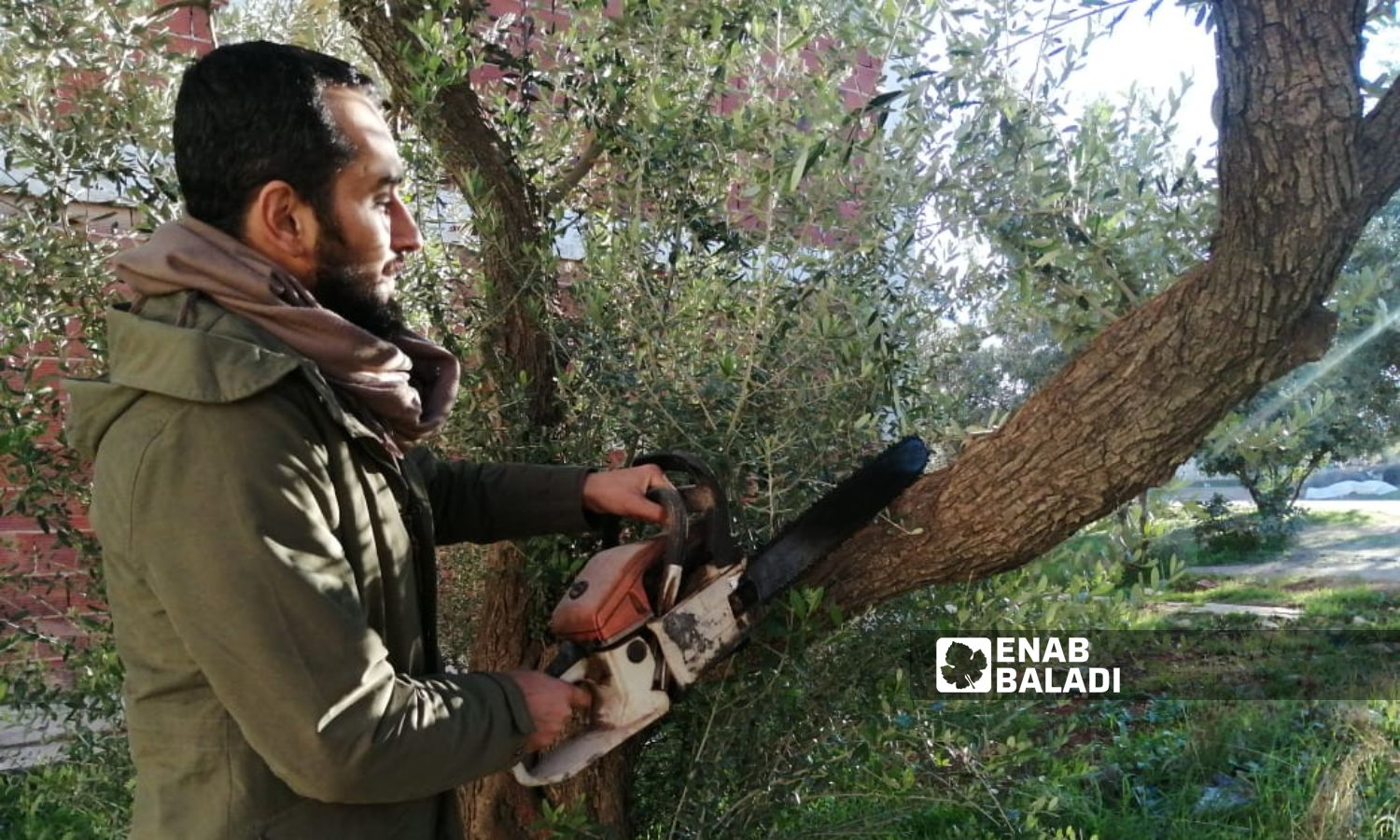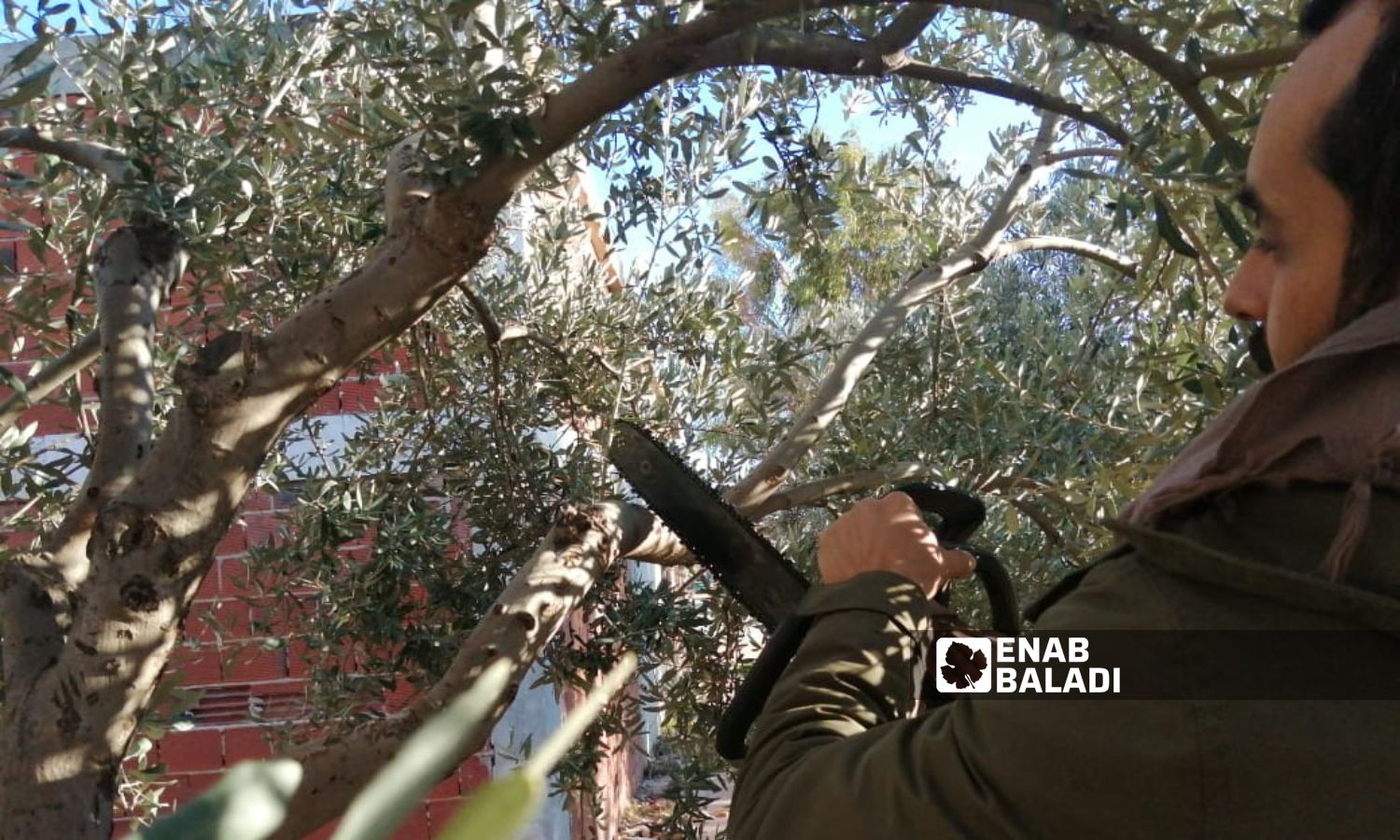



The season of pruning tree branches provides job opportunities for dozens of young people in Idlib governorate, especially for olive trees for which it is renowned.
The pruning work continues over a period of five months, starting at the end of the fruit-picking season until the end of spring, in Idlib, which is home to approximately 880,000 olive trees.
The working groups consist of individuals who have experience in this field and are skilled in tasks that are distributed among themselves.
Moreover, the pruning quality affects fruit tree production, and experience plays a crucial role in determining the wages and choosing the workers. Often, the workers inherit this profession from their fathers and grandfathers, according to farmers interviewed by Enab Baladi.
Pruning workers typically begin their work at the end of the olive fruit picking season, usually at the beginning of December each year. They work on removing excess branches and cutting dry wood from some trees in order for the trees to be ready to receive the winter season and grow optimally.
Experts recommend that the trees be pruned after the frost waves end, especially in cold areas, i.e., at the beginning of February, according to agricultural expert Yahya Tannari.
Tannari explained to Enab Baladi that most trees need pruning, but the method varies depending on the type of the tree. Olive trees are pruned differently depending on whether they are rain-fed or irrigated, and typically, in rain-fed cultivation, pruning is done once every two years.
In irrigated cultivation, which is fertilized with organic, mineral, and various fertilizers, and that gives vegetative growth throughout the year, trees are pruned lightly annually, and pruned extensively every four or five years, including the removal of dry wood.
Tannari added that a pruning worker must have experience and skill, as the nature of the olive tree’s production depends on its growth of the previous year. Thus, cutting the branches without experience significantly affects production, and reckless pruning makes the tree weak, requiring a period to compensate.

A young man pruning olive trees in Sarmin city, east of Idlib – December 14, 2023 (Enab Baladi/Shams al-Din Matoun)
The work tasks are distributed among several individuals who form specialized pruning groups, and they must have the necessary tools.
Mustafa Barghash, 30, from Sarmin city, has been working in pruning for several years, a profession he inherited the experience and equipment for from his father, who in turn inherited it from his grandfather.
Barghash told Enab Baladi that pruning olive trees starts at the end of the fruit-picking season and continues until the new fruit blossoms and that farmers prefer to prune the branches again if the tree did not bear good fruit.
He added that early pruning of the branches gives the trees greater benefit from the rainfall throughout the winter, while there is also a fear of their being affected by frost and subsequently losing their production for this year.
The pruning process starts early in the day, coinciding with the winter season when daylight hours are shorter.
Three workers take turns on the tree; one works on removing the stray branches from the middle of the tree, another works on its limbs, and a third works on the high branches, according to Barghash.
The profession requires special equipment such as saws and shears, which must be highly durable and are often locally made. This poses difficulties for the workers if their tools break during work, Barghash added.
The pruning workers receive their wages on a daily basis, and the wages of some workers range between five to ten US dollars per day, while others receive their pay in the Turkish lira, starting from 100 to 200 TL.
The exchange rate for the Turkish lira against the US dollar is 28.9 for selling and 29.3 for buying, according to the pricing of the Exchange Union in Idlib, approved in the region.
The wages are agreed upon between the farmer and the pruning workers, and their determination depends on several factors, as Badr Kharouf, the owner of a pruning work group, explained.
Kharouf told Enab Baladi that experience plays a primary role in determining the wage, as well as the number of working hours during the day and the achievements made by the worker during the working period.
He pointed out that in recent years, farmers have intentionally pruned their trees every year to benefit from the dry wood and small branches (twigs) for heating use. Some have also turned to learning pruning to reduce the expenses of tree care or have exaggerated in pruning the branches to increase the interval between pruning years.
if you think the article contain wrong information or you have additional details Send Correction